At the end of 2018, Fernando Cabrera, an Argentine entrepreneur, startet to do research for “green” coal.
He wanted to offer a value proposition and a proposal for social responsibility.
Environmental care is an important issue for him, and over the years he has studied how to make every weekend’s barbecue sustainable.
With this in mind, he founds BrasUp. With his company he’s betting to revolutionise the barbecue market.
It first launched a self-ignition wood charcoal box and now adds its new unique product in Argentina: the country’s first eco-friendly coal.
How is coal produced?
Eco-friendly coal is made from 100% organic waste, as it is based on the reuse of rice husk, which makes it a product with huge advantages over its natural competitor, charcoal, which is a fossil fuel and finite in nature.
So, it’s 100% ecological, has a higher heating value than charcoal and doubles the ignition time. It also doesn’t soil and doesn’t produce sparks.
The process of producing BrasUP charcoal begins with roasting the rice husk at high temperatures. It’s crushed, mixed with a natural binder and water. Then, it’s given shape. Finally, it goes through a drying process.
Even the machine used for carbonization is in line with a sustainable and environmentally committed policy. It was sure enough designed with recycled and reused elements.
The need for sustainable coal
The desire to produce eco-friendly coal arises from the fact that natural coal is the most polluting and dangerous source of energy in the world. It has been abandoned over the years, but not completely. The news about the damage caused by its exploitation continues unabated.
Fernando noted that the coal industry needed a change when he saw how it was produced. It was time for a change. In addition to respecting the environment, BrasUP’s goal is to drum up a business that can last for many years without depending on trees, which are an exhaustible resource.
In addition to producing this type of eco-friendy coal, there’s now a need to raise public awareness.
The starting point is to show that eco-friendly coal is priced similarly, around $ 200 for a 4kg bag, but with a higher heating value and a longer burning time than charcoal.
Thus, the consumer will only choose organic carbon over time.








